Blue Like Jazz
 for mature thematic material, sexuality, drug and alcohol content, and some language.
for mature thematic material, sexuality, drug and alcohol content, and some language.
Reviewed by: Jessica D. Lovett
CONTRIBUTOR
| Moral Rating: | Very Offensive |
| Moviemaking Quality: |
|
| Primary Audience: | Teens Adults |
| Genre: | Drama |
| Length: | 1 hr. 49 min. |
| Year of Release: | 2012 |
| USA Release: |
April 13, 2012 DVD: August 7, 2012 |
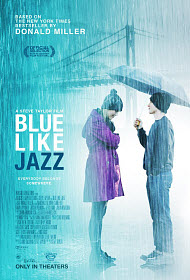



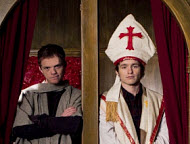
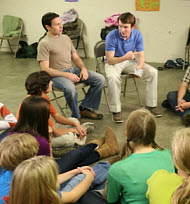
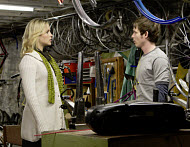
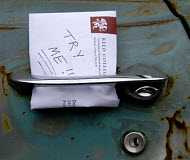
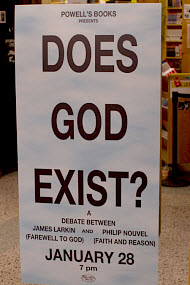
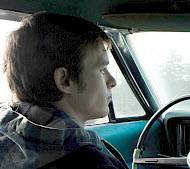

Is the religion of Secular Humanism being taught in public school classrooms? Answer
What is the legal and moral role of the Bible and Christianity in the U.S.A.? Should God be separated from American government? Answer
test of Christian faith on a liberal, secular college campus
How can we know there’s a God? Answer
What if the cosmos is all that there is? Answer
If God made everything, who made God? Answer
deciding what you truly believe
Novel: Blue Like Jazz: Non-religious thoughts on Christian spirituality (publisher: Thomas Nelson)—on which this film is based was written by Donald Miller
What advice do you have for new and growing Christians? Answer
CHURCH—Why should Christians go to church? How important is it? Answer
HYPOCRISY IN THE CHURCH — “I would never be a Christian; they’re a bunch of hypocrites.”
What should you do if hurt by someone who says they are a Christian?
Are you good enough to get to Heaven? Answer
| Featuring |
|---|
|
Claire Holt … Penny Tania Raymonde … Lauryn Jason Marsden … Kenny Marshall Allman … Donald Miller Eric Lange … The Hobo See all » |
| Director |
| Steve Taylor—“The Second Chance” |
| Producer |
|
Ruckus Films Marshall Allman … executive producer See all » |
| Distributor |
“Life is like jazz, son… It never resolves.”
Based on Donald Miller’s bestselling novel, this independent film’s popularity has skyrocketed, burning pages through both the Christian and secular press, but no one really knows where to put it. It has been called a “Christian film,” but is it really? On the one hand, it addresses the deep need for Spirituality in this incoming college-age generation, who are being shaped by humanist and postmodern ideas and shows them a tangible hope of redemption. The film openly expresses the emptiness that they feel when trying to approach religion openly and are slammed with the wrong answers to their piercing questions.
On the other hand, it is crammed with angry mockery of the Church and Christianity, incessant cursing, blasphemy, crude bawdy humor, and all the superfluous and base joking that one might expect in any contemporary comedy, just out to get cheap laughs. Even though the plot has been called “groundbreaking,” it seems to me to be a modern twist on the Prodigal Son story (see Luke 15), in which we are drug along with the Prodigal on all of his rebellious, adolescent adventures, or misadventures, as the case may be.
Even though the parody of the Christian faith throughout the film is supposedly covered over by the main character’s redemption in the end, the film’s main billing as a “comedy” unequivocally relies mainly on this poking fun at Christianity. Say a coworker teased you incessantly about something every day for years and then quickly uttered an apology one day out of the blue. Would his mumbled, “I’m sorry” be deep enough to bury the all the hurt he’d caused you in the past? The same with this film… The quick redemption at the conclusion simply isn’t outweighed by the heavy blasphemy one must wade through to get to it.
The story revolves around Donny, a staunchly Southern Baptist community college sophomore who has his conservative background and Christian faith shaken when his mother has an affair with his church’s youth minister. Lashing out from this painful experience, he enrolls in the most liberal university he can find at the suggestion of his alcoholic, hobo father, and commences to embark on all he previously thought of as wrong in his former life. In the beginning, the scenes of Donny’s small church on Sunday morning have the pipe organ churning out circus-like background music, highlighting the misdirection of the faith foundations in the remainder of this movie. Kenny, the youth minister, orchestrates a skit in which a Mexican puppet named “Tito” directs the children of the church to break open a cross-shaped piñata, saying that “just like a piñata had to be broken to make candy, Jesus had to die on the cross for our sins.” The children then realize that the falling “candy” is really individual containers of communion bread and wine, and they commence to distribute it to the congregation, saying that “the blood and the body of Christ is even better than candy.”
In many awkward fish-out-of-water moments, Donny finds refuge in the neutral music of Coltrane and other jazz greats. Jazz is the one place he can go where his troubles do not follow. It is sad to watch Donny shy away from defending his faith to those who antagonize him, as he “feels lost in a sea of individuality.” He notes that everyone knows “who they are” except him. This statement does show that we, as Christians, have a duty to show the new generation the contentment that is only possible in a fully-realized and grounded faith in Christ. There are several bittersweet, introspective, and even cinematically beautiful moments, but, in the end, the movie feels like a contrived collection of mildly philosophic thoughts on the nature of religion disguised as a modern collegiate-sex-comedy, in order to get disillusioned post-modernists to perhaps accidentally reevaluate their views of Christ.
The only reason I can see for a Christian to watch this film, if they are armed well against all of the negatives it presents, would be just to get a glimpse of the ugly stereotype of “Christian” that the unchurched sees, in order to fight it more skillfully. Yet, there are no profound truths to be discovered or any revolutions to transform the heart in “Blue Like Jazz.” Those looking for an “American Pie,” will be mad, and those looking for a “Courageous” will be disappointed.
Moral and/or spiritual cautions: High sexual and homosexual content / references to breastfeeding an animal / condom balloon placed on church steeple / women storming a men’s restroom / men in underwear / revealing women’s clothing / crude slang / brief story of a rape / wild party scene / adultery / pregnancy out of wedlock (however, no explicit nudity or explicit sex scenes) / urination / vomiting / alcohol use and drunkenness / illegal drug use / at least 20 uses of profanity / blasphemy and blasphemous one-liners, such as, “Don’t let these people [Christians] reproduce,” “Every steeple hides a sleeper cell,” and “The Bible’s meaning is hopelessly muddled.” / portrayal of Christians as being naïve, backward “wackos” / woman calls Christians “a hateful, bullying tribe” / Donny is disrespectful to his parents.
Violence: Vandalism of a car / vandalism of billboard / Donny arrested / college students disrespectfully torment bookstore patrons and employees / man burns books (but refrains from burning a Bible) / Donny throws cell phone into “holy water” / (no bloody violence).
Violence: Moderate / Profanity: Heavy / Sex/Nudity: Moderate
See list of Relevant Issues—questions-and-answers.


Rather, this movie speaks truth as to how God is misrepresented in our society and why He is not represented the way he should be. I saw this in a screening and… This is not your cheesy Christian film, with bad acting and poor filming. The cast list is amazing, and the acting is even better, along with the cinematography! Like I said “this is not your cheesy Christian film”. There are many scenes where the main character is trying to find his “true self,” through drinking and drugs. Though I do not agree with those actions myself, I realize that this film speaks truth as to how many of our teens are living their lives, therefore the movie does not escape tough issues that we often like to hide.
Just getting out of college myself, I’d say that this movie is an excellent selection to show teenagers and anyone who is in high school and ready to go to college. In fact, it would do a lot of people good if they were to see this film.
Plus, the movie is really funny, I was surprised, very entertaining. It is only playing in selected theaters, which really stinks, but do your research to find where it is playing near you! Also, you can search for discussion questions to use at your church or small group to use after seeing the movie with a group!
Moral rating: Average / Moviemaking quality: 5
Moral rating: Average / Moviemaking quality: 5
Moral rating: Better than Average / Moviemaking quality: 5
Moral rating: Better than Average / Moviemaking quality: 4½
Other reviewers have asked, who is this movie for? The “unchurched” won’t buy it, and “Christians” will be offended. While it is true that ATHEISTS won’t agree with the end message and FUNDAMENTALISTS may be offended, the message can easily appeal to the huge section of the population who fall into neither of these two camps and might classify themselves anywhere from agnostic to spiritual to mainstream/progressive Christian. I just wish the film was a better vehicle for the message.
Moral rating: Better than Average / Moviemaking quality: 3
The storyline—its reality and honesty—is a good one. But it hides behind the movie as it plays out, and you have to try to hang on for what you know the author and director are trying to say. It really is like going to a strip-tease show, only hoping that the Christian band at the end will make it all worthwhile. It wasn’t.
I sadly cannot recommend this movie to anyone—not to the unchurched, who will be confused as to how a Christian movie can endorse such content, and certainly not to the Church, who will likewise be offended by lesbian sexuality, extreme profanity, etc. Who was this movie made for?
Moral rating: Very Offensive / Moviemaking quality: 5
PLEASE share your observations and insights to be posted here.



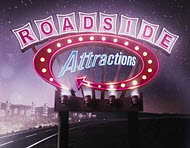
This movie is about God, but it never preaches to you once. It will completely flip your previous notions of what God is like and will comfort you by showing you that you’re not alone in your confusion and mess, and that there IS more to this life.
The acting is so authentic, and the cinematography is beautiful. I have read all of Donald Miller’s books, and this exceeded my expectations. You can’t miss this movie; the book was literally life-changing for me, and I know it will be for many others. While many people may not set foot in a church, for one reason or another, they may set foot in the theater to see this film, and if it’s the only Bible they ever read, it will clearly show them how much God loves them. It vividly shares the Gospel with both believers and non-believers alike.
I didn’t give it a moral rating, because that’s a tough call to make without an explanation. There are definitely scenes that are not “family-friendly,” but not all of the Bible is family-friendly either. It gives a real, honest, non-watered down representation of the broken world we live in—the world we need to be rescued from.
My Ratings: Moral rating: / Moviemaking quality: 5